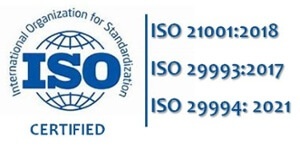
In this increasingly data-driven world, safeguarding sensitive information and respecting individuals' privacy rights is becoming more and more important. Because of this, having a Data Protection Officer (DPO) in your organization is a must in ensuring data protection compliance.
How to be a Data Protection Officer
Becoming a DPO requires certain qualifications, knowledge, and skills to excel in the role. In this post, let's take a look at some of the ones you'll need the most.
Qualifications
So far, there is no nationally or internationally recognized qualification that will make you an expert Data Protection Officer - DPO (regardless of any claims a training provider may make); however, it doesn't hurt to have demonstrable experience in data protection which you can obtain through professional training and real-life practice.
A note on UK GDPR: At the time of writing, UK GDPR is essentially identical to EU GDPR. After Brexit, the UK government adopted EU-GDPR in its entirety as UK-GDPR with the substitution of the Information Commissioners Office (ICO) for EU National Data Protection Authorities. The intention of the British Government is to abandon all EU Regulations by the end of 2023.
While it is impossible to replace the approx. 2500 pieces of legislation involved before the deadline, the expectation is that, when it occurs, new UK data protection legislation will remain closely aligned with EU regulation in order to maintain the most valuable prize of retaining the adequacy decision for the UK, ensuring the continued free flow of personal data between the two blocs. In any case, UK-GDPR will remain applicable until mid-2025.
Knowledge
- Knowledge of Regulatory Requirements - Data protection regulations, such as the General Data Protection Regulation (GDPR) in Europe and the California Consumer Privacy Act (CCPA) in the United States, have complex legal requirements. DPOs must have a strong understanding of these regulations, including their rights, obligations, and implications. You should be able to interpret and apply the law to their organization's data processing activities.
- Knowledge of Data Privacy Principles and Practices - A DPO should be well-versed in data privacy principles and practices. These include understanding data collection, data subject rights, data portability, data storage, processing, and transfer. You must know how to perform data protection impact assessments (DPIAs) and understand the risks associated with various data processing activities.
- Understanding of How information Technologies Relate to Data Security - Certification to ISO 27001, the information security management system, will significantly help here. Indeed, compliance with GDPR requirements should already have been addressed in such a system. Otherwise, your own work in initiating a personal data protection system will provide the answers, and undoubtedly, documentation of the implementation and maintenance of the organization's ITC systems will be available.
- Knowledge of the Organization and the Processing Operations Carried Out - Experience gained over time while working on the organization's data privacy and protection system will help provide such understanding. Also, any analysis done and recorded when the current personal data protection system was planned and implemented should be studied. If none exists, your own work initiating a personal data protection system will provide the answers.
Skills
- Communication and Interpersonal Skills - Effective communication is essential for a DPO. You need to be able to convey complex legal and technical information to colleagues at all levels of the organization. Additionally, interpersonal skills are crucial when dealing with data subjects, supervisory authorities, and other stakeholders. (Note that the internal auditing of your systems against GDPR requirements, which involves interactions with staff at all levels, is an excellent way of promoting GDPR awareness generally)
- Problem-Solving and Analytical Abilities - DPOs should be adept problem solvers. You need to be able to assess data protection issues and find solutions that align with legal requirements and business goals. Strong analytical skills will help you identify potential risks and compliance gaps.
- Ethical and Professional Conduct - Integrity and ethical conduct are paramount for a DPO. You should be committed to upholding individuals' privacy rights and act as impartial advisors within the organization.
With a combination of the above, together with continuous learning, you will have the necessary tools to navigate the complex and ever-changing landscape of data protection and be a crucial asset to your organization's bid for data privacy and security.
Related Articles
- Free ISO 27001 Implementation Handbook (100+ pages)
- Navigating the fifty-six ISO 27000 Series of Standards
- Information Security Standards other than ISO 27001
- How does ISO 27001:2022 Compare with ISO 27001:2013?
deGRANDSON Global is an ISO Certified Educational Organization
We have chosen ISO 21001 certification because, unlike IRCA and Exemplar badges (which in our opinion are commercially compromised), it is based on independent third-party assessment. It is a ‘university grade’ standard in use globally by schools, colleges, and universities to demonstrate their competence.


